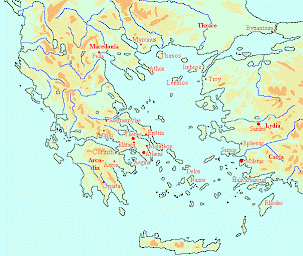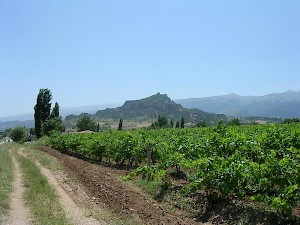Herodotus, bk 5, logos 16
Herodotus of Halicarnassus (c.480-c.429 BCE): Greek researcher, often called the world's first historian. In The Histories, he describes the expansion of the Achaemenid Empire under its kings Cyrus the Great, Cambyses, and Darius I the Great, culminating in Xerxes' expedition to Greece (480 BCE), which met with disaster in the naval engagement at Salamis and the battles at Plataea and Mycale. Herodotus' book also contains ethnographic descriptions of the peoples that the Persians have conquered, fairy tales, gossip, and legends.
The Ionian Greeks capture Sardes (5.97-5.126)

At the beginning of the last logos of Book Five, Herodotus returns to the point where he had started the preceding logos: Aristagoras of Miletus asks Athens for help against the Persians. The people's assembly decides to send a fleet of twenty warships to help the Ionian Greeks. Five ships are added by the town Eretria, which had to pay a debt of honor to the people of Miletus.
The sailing of this fleet was, in Herodotus' opinion, the beginning of the trouble for the Greek homeland. Its marines land at Ephesus, where they join forces with the troops of the Ionian Greeks. This army delivers a surprise attack on the capital of the Persian governor Artaphernes, Sardes. Except for the citadel, the complete town is burnt to the ground, including the sanctuary of the mother goddess Cybele.

After this success, the Ionian Greeks disperse for the winter. They are an easy target for Artaphernes' army, which inflicts a minor defeat on the looters of the sanctuary. This Persian victory cannot prevent the revolt from spreading to the Greek towns of Cyprus, to the Carians, and to the Greeks living between the Hellespont and Bosphorus.
When king Darius hears from the rebellion, he implores his god to grant him the punishment of the Athenians and orders a servant to remind him of the Athenians three times a day. He brings an army together, and orders his courtier Histiaeus of Miletus (above) to command it against the Ionian cities.
At the same time, the Phoenician navy ferries a Persian army to Cyprus. In a naval engagement, the Phoenician is defeated by a squadron of the Ionian Greeks, but treason allows the Persians to reconquer the island.
The Persians send two other armies against the Carians and the Hellespontine Greeks; both armies are victorious and Miletus is left alone. Aristagoras flees from his town to Myrcinus, where he is killed by the Thracians.
Comment
The spread of the Ionian revolt to the Hellespont and the Bosphorus in 498/497 was strategically very important. From now on, the Persian army in Europe was isolated.
Herodotus' judgment that Aristagoras fled to Myrcinus in Thrace must be incorrect. He and his men were probably trying to force the Persians in Europe to surrender. Had Aristagoras been successful, the Ionian Greeks would have had their back covered. Moreover, control of the straits meant control of the grain trade from the Black Sea. Small wonder that the Hellespont was the first target of the Persian counterattack (Summer 497). The Cypriotes were reduced to submission in 496, allowing a newly built Phoenician navy to sail into the Aegean Sea.
Herodotus does not tell us that in 495, Rhodes was subdued by a Median admiral in Persian service, whose name was Datis. This can be deduced from an inscription which was found on Rhodes, and it is corroborated by the tablets found at Persepolis (quoted here).